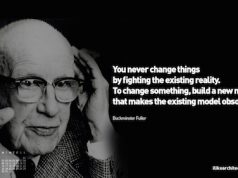The lungs of the earth? Time-lapse images from NASA
MESH Cities don’t exist outside of the global environment. They are an integral part of it. In fact, if they are truly as intelligent and livable as they aspire to be, the cities of tomorrow will augment the earth’s homeostatic systems not destroy them.
The above sequence of images from NASA is a metaphorical representation of the earth’s “breathing” process. They are made possible by advanced satellite and imaging technologies. Similarly, as the Internet of Things becomes ubiquitous, its data will allow researchers to identify, measure, and improve energy use, CO2 production, etc. across an extended range of human activities.
That includes our now dominant form of social organisation;our cities.
Imagine an image like the one above showing the world’s cities responding in real time to systemic environmental conditions. MESH Cities authors think it is possible, but we probably won’t get there in the same prescriptive, linear way we built the civic infrastructure of the 19th and 20th Centuries.
Why?
When interconnected systems become sufficiently complex, meta-patterns of nonlinear organisation begin to appear in ways that defy predictions. We’ve written about these phenomenon. Look at the connection between <a href=”http://meshcities.com/index.php/meshcities/comments/the_truth_behind_cities_brains_and_mesh_cities_part_two”>brains and cities as just one example</a>. There are many more.
So even as the petroleum industry does its best to impede our transition to a sustainable energy economy, under the covers forces are evolving to disrupt the old way of organising;world systems and replace it with another, more efficient model. Cities will be driving the change.
It won’t be easy or happen quickly. We are often amazed at how long the future takes to arrive. It will, however, happen. So join us in celebrating the lungs of our planet while we design cities to enhance rather than destroy;them.






